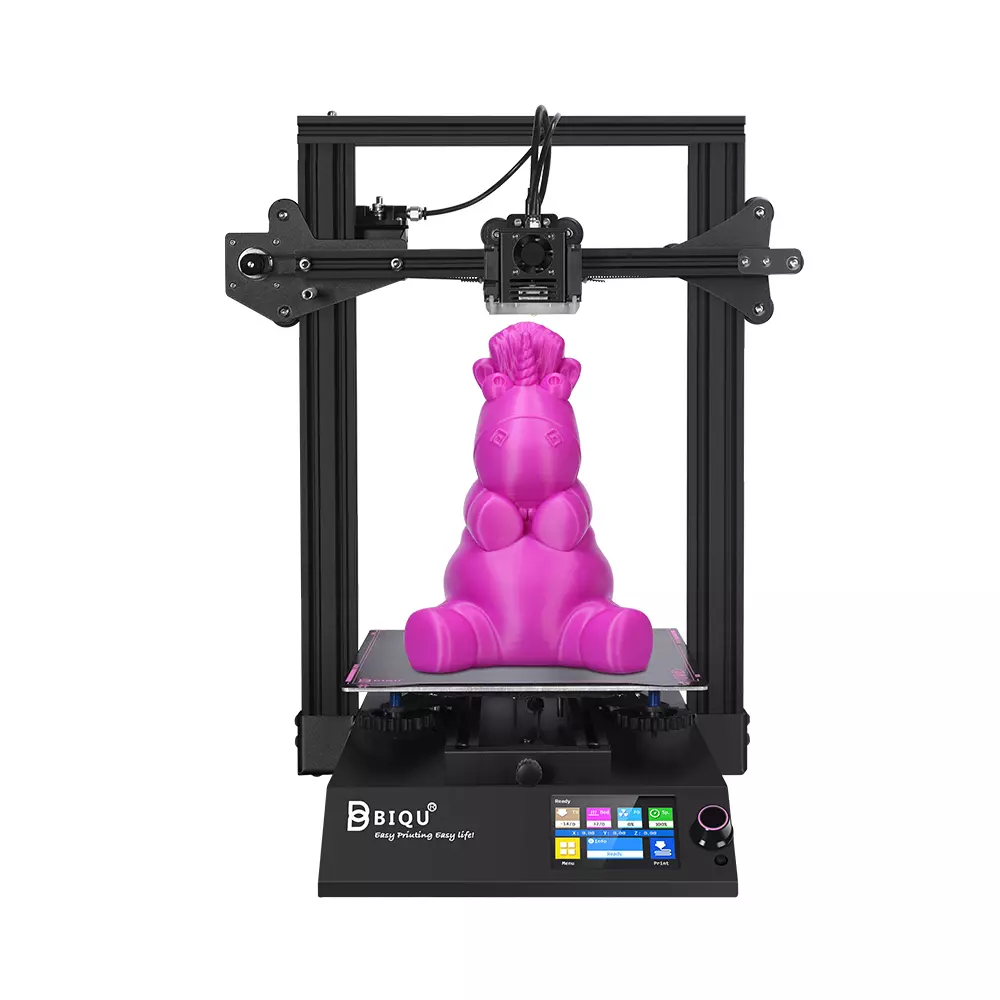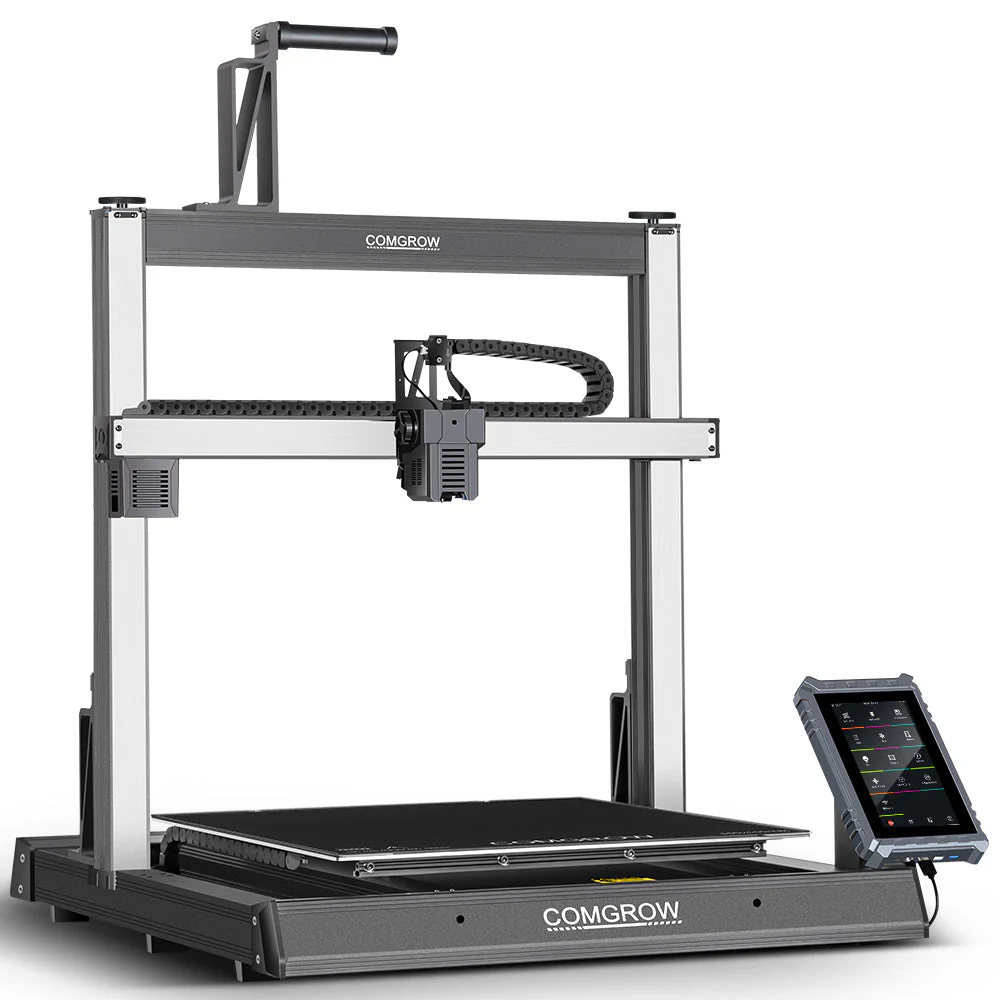Compare BIQU B1 vs Comgrow T500
Comparison between the best 3D printers
Choose the best 3D printer at the best price. The cheapest 3D printers are here.
Buy a 3D printer here with 3D Fila.
 |
 |
|
| Model | BIQU B1 |
Comgrow T500 |
| Printing Material | Filament | Filament |
| Buy Filament for BigTreeTech BIQU B1 | Buy Filament forSovol Comgrow T500 | |
| Estimated price | $269,00 | $799,00 |
| Manufacturer | BigTreeTech | Sovol |
| Release Year | 2020 | 2024 |
| Print Volume [mm] | 235x235x270 | 500x500x500 |
| Printer Size [mm] | 412x402x492 | 817x810x962 |
| Weight [kg] | 8,00 | 39 |
| Power Loss Recovery | YES | YES |
| Enclosed printer | NO | NO |
| Bed Leveling | Manual | Automatic |
| Filament End Sensor | YES | YES |
| Bed type | Heated | Heated |
| Power supply system | Bowden | Direct Drive |
| Standard nozzle | 0,4 | 0,4 |
| Maximum Nozzle Temperature [°C] | 250 | 300 |
| Maximum Bed Temperature [°C] | 100 | 80 |
| Maximum printing speed [mm/s] | 100 | 500 |
| Filament holder | YES | YES |
| Camera for supervision | NO | NO |
| Recommended filaments | PLA, TPU, ABS, PETG | PLA, PETG, Fibra de Carbono, TPU |
| Recommended slicers | Cura, Simplify, Slic3r | Creality Print, Cura 5.0 ou superior, Prusa Slicer, Orca |
| Maximum Resolution [mm] | 0,1 | 0,1 |
| Processor | 32 Bits BTT SKR V 1.4 | |
| Display | Touchscreen TFT 3,5'' | 7'' IPS touchscreen, 60Hz |
| Power Supply | 24V / 360W | 500 W |
| Connectivity | SD / USB | |
| Operating systems | Windows, Mac, Linux | |
| Date of registration in the system | 2021-04-14 | 2024-07-18 |
| Release date | 2020 | 2024 |
| Extra features | The BIQU B1 is an advanced 3D printer with a silent 32-bit BTT SKR V1.4 motherboard and ARM Cortex-M3 CPU, offering DIY interfaces (I2C, SPI, WiFi) and dual Z-axis. Its dual BTT B1 TFT35 V3.0 operating system allows real-time monitoring and multiple printing modes, including G-code visualization effects. It stands out for its BIQU SSS (Super Spring Steel), ensuring easy model adhesion and simplified removal, with the possibility of using it on both sides. It includes a filament sensor, automatically pausing printing in case of filament breakage. The multicolored RGB lights integrated into the hotend allow you to view the printing status even at night. Additional notes include the need for a BIQU-specific Type-C cable and extra interfaces for smart filament sensor and BL Touch. | The Sovol Comgrow T500 stands out for its large print volume of 500x500x500 mm, ideal for large-scale projects. It has a direct extruder with a gear ratio of 6.5:1, speeds of up to 200 mm/s, and high-performance motors. The 7" touchscreen with Klipper software makes navigation easy. The 49-point automatic leveling ensures a perfect first layer. It also has a full metal hotend at 300°C, linear rails on all axes, and WiFi connectivity. |
| Support for multiple colors and materials (AMS and CFS) | NO | NO |
Notes * |
||
| Cost-benefit | 7 / 10 | 7 / 10 |
| Hardware | 2 / 10 | 3.2 / 10 |
| Tela | . | . |
| Print volume | 3 / 10 | 5 / 10 |
| Performance | 1 / 10 | 4 / 10 |
Conclusion |
| In conclusion, the BIQU B1 and Comgrow T500 are both solid choices in the 3D printer market, each catering to different user needs and preferences. The BIQU B1 is an affordable entry-level printer suitable for hobbyists seeking a reliable, compact machine for smaller projects. Its lightweight design, ease of use, and essential features make it a great option for those new to 3D printing or those with limited space. On the other hand, the Comgrow T500 comes at a significantly higher price but offers substantial advantages such as a much larger print volume and automatic bed leveling, making it ideal for professional users or serious enthusiasts working on larger or more complex projects. Its advanced features, like the direct drive system and high-performance components, enhance print quality and speed, appealing to those who value precision and efficiency. When weighing cost versus capability, the BIQU B1 scores well on affordability but may not meet the needs of those requiring larger print areas or advanced functionalities, while the Comgrow T500 excels in performance but mandates a higher investment. Ultimately, the choice between these two printers depends on the user's specific needs, budget constraints, and desired applications in 3D printing. |

